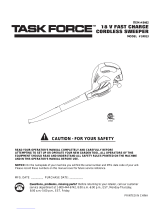
5
ENGLISH
(Original instructions)
u Do not expose appliance to rain or wet conditions. Water
entering a appliance will increase the risk of electric
shock.
u Do not abuse the cord. Never use the cord for carrying,
pulling or unplugging the appliance. Keep cord away
from heat, oil, sharp edges or moving parts. Damaged or
entangled cords increase the risk of electric shock.
u When operating an appliance outdoors, use an extension
cord suitable for outdoor use. Use of a cord suitable for
outdoor use reduces the risk of electric shock.
After Use
u When not in use, the appliance should be stored in a dry,
well ventilated place out of the reach of children.
u Children should not have access to stored appliances.
u When the appliance is stored or transported in a vehicle
it should be placed in the boot or restrained to prevent
movement following sudden changes in speed or direc-
tion.
Service
u Have your appliance serviced by a qualied repair person
using only identical replacement parts. This will ensure
that the safety of the appliance is maintained.
u Power to the tool should always be supplied via residual
current device with a rated residual current of 30mA or
less.
Additional Safety instructions for sweeper
The intended use is described in this manual. The use of any
accessory or attachment or performance of any operation
with this appliance other than those recommended in this
instruction manual can present a risk of personal injury and/or
damage to property.
u To protect your feet and legs while operating the appli-
ance, always wear heavy duty footwear and long trousers.
u Always switch off your product, allow the fan to stop and
remove the plug from the socket when:
u The supply cable has become damaged or entangled.
u You leave your product unattended.
u Checking, adjusting, cleaning or working on your
product.
u If the appliance starts to vibrate abnormally.
u Do not place the inlet or outlet of the sweeper near eyes
or ears when operating. Never blow debris in the direction
of bystanders.
u Do not use in the rain or leave outdoors while it is raining.
u Do not cross gravel paths or roads whilst your product is
switched on during blow mode. Walk, never run.
u Do not place your unit down on gravel while it is switched
on.
u Always be sure of your footing, particularly on slopes. Do
not overreach and keep your balance at all times.
u Do not place any objects into the openings. Never use if
the openings are blocked - keep free of hair, lint, dust and
anything that may reduce the airow.
Warning! Always use your product in the manner outlined in
this manual. Your product is designed to be used in an upright
mode and if it is used in any other way it may result in injury.
Never run your product whilst lying on it’s side or upside down.
u The operator or user is responsible for accidents or
hazards occurring to other people or their property.
u Do not carry the appliance by the cable.
u Always direct the cable to the rear away from the appli-
ance.
Warning! If a cord becomes damaged during use, disconnect
the supply cord from the mains supply immediately. Do not
touch the supply cord before disconnecting the supply.
u Do not use solvents or cleaning uids to clean your
product. Use a blunt scraper to remove grass and dirt.
u Replacement fans are available from a Black & Decker
service agent. Use on Black & Decker recommended
spare parts and accessories.
u Keep all nuts bolts and screws tight to make sure that the
appliance is in a safe working condition.
Safety of others
u This appliance is not intended for use by persons (includ-
ing children) with reduced physical, sensory or mental
capabilities, or lack of experience and knowledge, unless
they have been given supervision or instruction concern-
ing use of the appliance by a person responsible for their
safety.
u Children should be supervised to ensure that they do not
play with the appliance.
Residual risks.
Additional residual risks may arise when using the tool which
may not be included in the enclosed safety warnings. These
risks can arise from misuse, prolonged use etc.
Even with the application of the relevant safety regulations
and the implementation of safety devices, certain residual
risks can not be avoided. These include:
u Injuries caused by touching any rotating/moving parts.
u Injuries caused when changing any parts, blades or ac-
cessories.
u Injuries caused by prolonged use of a tool. When using
any tool for prolonged periods ensure you take regular
breaks.
u Impairment of hearing.
u Health hazards caused by breathing dust developed when
using your tool (example:- working with wood, especially
oak, beech and MDF.)














